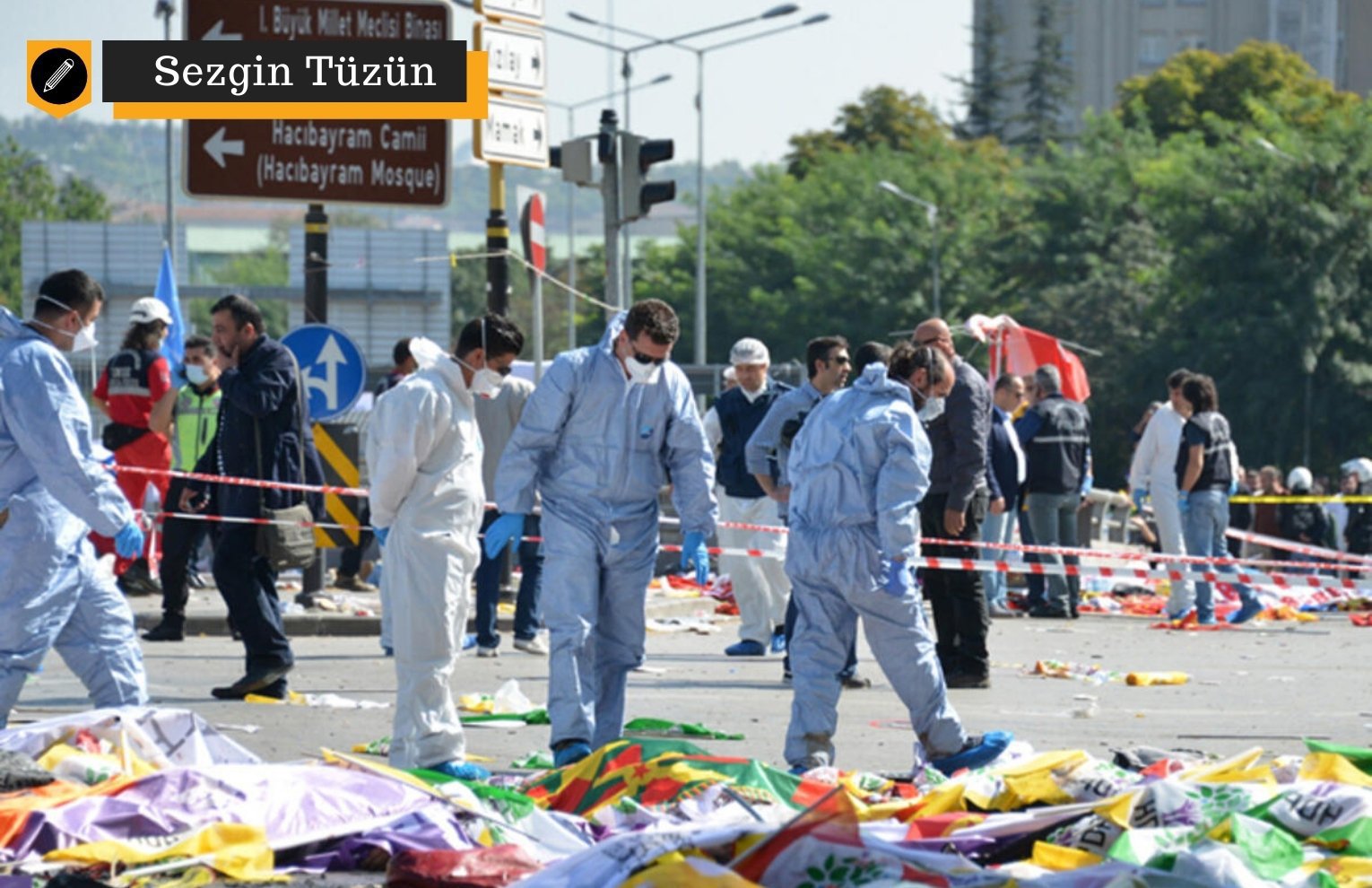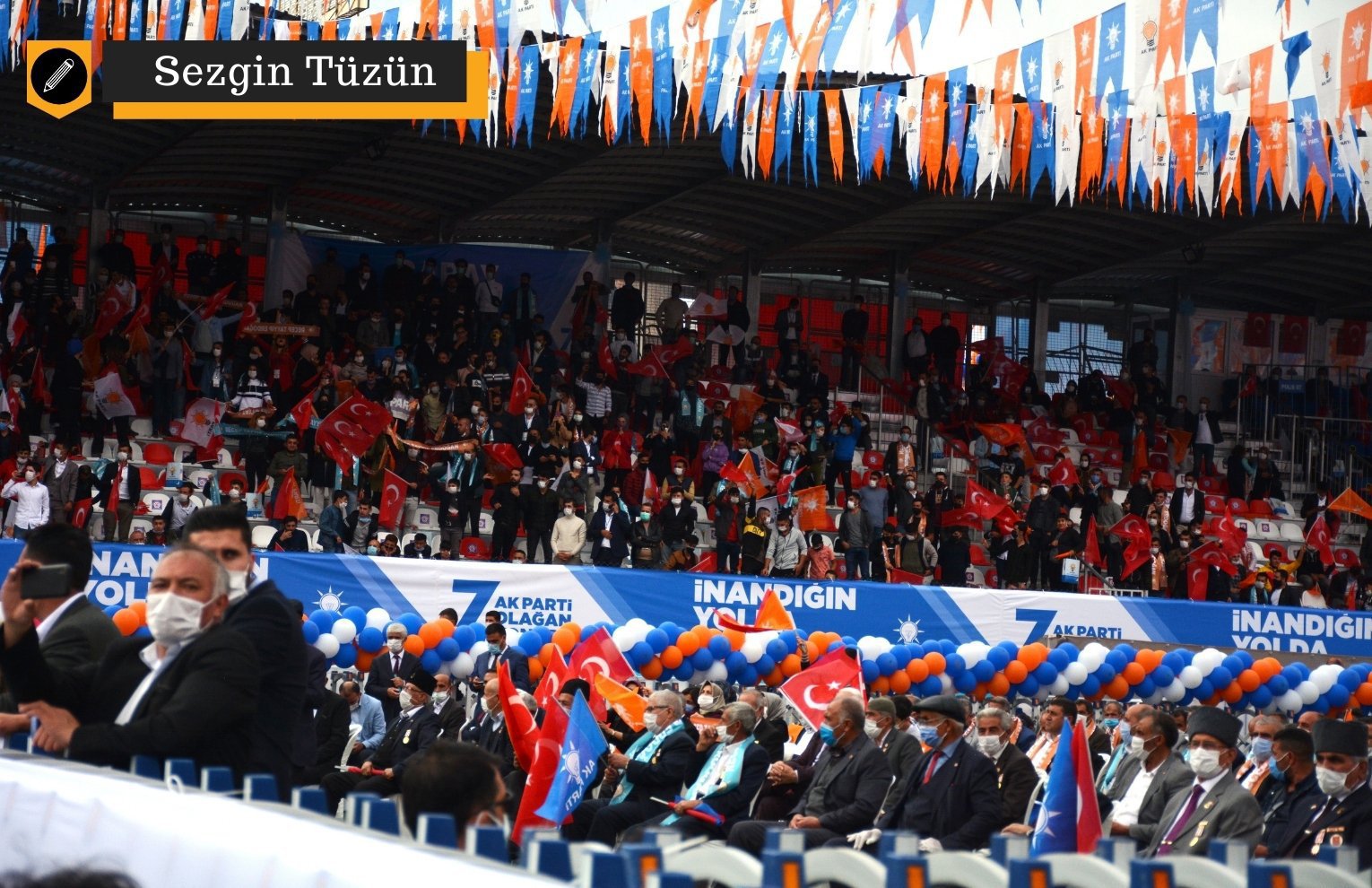Aftermath of the ISIS bombing during a rally that claimed 109 lives in October 2015. (Photo: AA/File)
Click to read the article in Turkish
Two days before the June 7, 2015 elections, a bomb placed at the square where HDP's last pre-election rally was held exploded, killing five people and injuring many others. On July 17, Recep Tayyip Erdoğan declared that he had renounced the ten-point solution process agreement signed in Dolmabahçe and announced that he had ended the process.
"Without AKP, there will be terror"
The Suruç massacre took place on July 20, and the explosion took the lives of 33 young people. On July 22, the solution process was finalized after two police officers were killed in their home in Ceylanpınar. On October 10, two suicide bombs exploded in front of Ankara Train Station, causing thousands of people who came to attend the rally to scatter and injure and 102 people to lose their lives.
Findings that ISIS (Islamic State of Iraq and the Levant) members and suspects were behind the bombings and killings were mentioned, accusations were directed against ISIS and the PKK. After all these and similar events, the dominant discourse turned into "If AKP is not in power; terror will threaten whole Turkey."
Victory in the second election
In the repeated election on November 1, 2015, AKP increased its votes by 8.34 points with the registered voter base, while the election turnout and valid votes increased by 2.17 points. MHP lost 3.44 points and the other parties 3.18 points, regaining AKP the electoral support it had achieved in the 2011 elections. At first glance, all other parties lost their votes due to the increase in AKP's between June and November. Thus, AKP emerged with a great victory again.
The exchange between right-wing parties
However, this was not the real case. Because while voters who voted for the left-wing parties (CHP, HDP, and leftist-socialist parties) were equal to 25.80 percent of the total registered domestic voters in the 2011 elections, this rate increased to 32.49 percent in the June 2015 elections.
In the November elections, the proportional size of these votes decreased to 31.78 percent. In other words, the situation indicates a vote loss of 0.71 points. Therefore, if AKP's vote gain in the June-November period is explained by the new voters with 2.17 points and the left-wing voters with 0.71, then right-wing parties constitute the origin of the 5.46 points of AKP's vote gain. In other words, the high vote exchange among the right-wing parties is the factor that made it possible for AKP to come to power alone again in the November elections.
However, AKP's latest achievement did not last long enough. AKP lost 5.98 points of its 8.34-point increase in 4-5 months in the next election which was held in 2018. In the 2018 elections, AKP's vote loss, despite the fact that the level of participation in the election did not decrease, but increased, makes it even more remarkable.
Because this loss was not due to the voters of AKP walking away from the ballot box, but by them returning to the party they came from, or by those voters gravitating towards other parties. Through this, the importance of the 2018 elections in terms of recognizing/defining AKP and its government becomes clear.
From pan-nationalism to nationalist Islamism
From now on, Erdoğan and AKP realized that the 2002-2015 period had come to an end and that new constructs were inevitable in order to remain in power and set sail from pan-Islamism to nationalist Islamism through joint recruitment and replacement. Meanwhile, with the awareness that the last stop of the tram has been reached, the masses entered an inevitable stage to recognize that the issue is not to rise to power - as it was intended from the beginning, under all conditions - but to stay in power.
The table above was arranged in order to show AKP's vote loss and gains, the exchange of voters between parties, and the numerical-proportional size of these exchanges in the June-November 2015 elections. The table was created based on the total registered voters in the country and AKP's vote loss-gains.
The table shows the magnitude and sources of AKP's vote shifts between the 2011 elections (21,306,826) to the level it had reached in the November 2015 elections (22,959,394). This display makes two important findings visible. The first is the high voter permeability between AKP-MHP-AKP, and the second is that AKP can only return 38 out of every 100 votes it loses to parties with leftist discourse.
For whom the bell tolls
Turning back to the table (distribution of votes in the 2002-2018 elections provided on the second day of the series) and the 2018 elections, it is seen that not only AKP but also the components of the People's Alliance faced a significant vote loss when we look at the elections through 2015 until 2018.
If the comparison is not made according to November 2015, but to 2011 when the new structure started to enroot and AKP reached the highest vote level, it is measured that the People's Alliance components' loss is 8.01 points, which equals to 15 percent shrinkage. When calculated only for AKP, these figures mean a decrease of 5.94 points and 14 percent. In other words, it seems that the bells have started to toll for both AKP and the People's Alliance components.
The difficulty of convincing the masses
While this movement is a difficult process to reverse even under normal conditions; in an environment where a great crisis and economic chasm are experienced, and the pandemic is sweeping the country and the world, it will create a much more difficult process and drag the ruling party and its components into new challenges. One wonders with which alternatives it may be possible to get free from the grasp of that challenge. Which of the plans for this salvation will coincide or conflict with the People's Alliance components' calculations?
This is where we reach the real point! With a clear definition, the answers to the questions of whether the road can be continued after the phase of getting off this tram, or how the action to go down this road will be - if - it is to be continued, becomes important. This reveals the need for the essence of the issue to be expressed clearly and to be understood by the masses. However, then the difficulty of persuading the masses to this new path is placed before the ruling party.
TOMORROW: The series continues with an article titled "Frames drawn and could not be drawn by public opinion surveys" regarding the results of the researches reflected in the public by six different organizations.
COMING TO POWER BY ELECTIONS AND NEVER LEAVING
1- The stones of power laid on the roads
2- The ambition to 'get off the tram'
(ST/NÖ/DCE/VK)







.jpg)
.jpg)
.jpg)